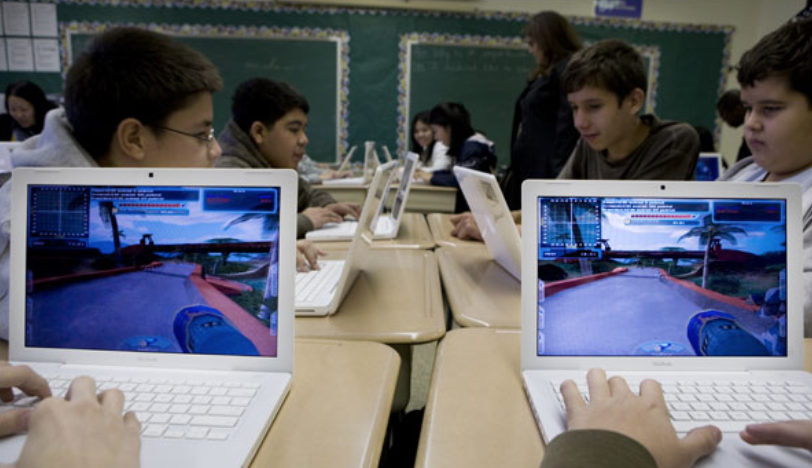Video games help people learn, struggle and ultimately adapt to the real world
May 18, 2015
Let us talk about video games. Not about violence, because that debate is old and null, but about why videogames are so popular. It pulls us out of life, out of our daily happenings and into another universe made up of ones and zeroes. They bring us happiness, they bring us joy, and they take us out of the boring and terrible world in which we live, and place us into another one. But why and how?
At its core, a video game, whether it is League of Legends, Ori and the Blind Forest, Hearthstone, or Call of Duty, is a game. It is bound by a series of created rules, obstacles and success-failure conditions which we must contend with to achieve single or multiple goals. It places us in a situation where we will have the odds stacked against us, often increasing as we proceed further into the game, which we must overcome to win. In a game, we will fail many times, from a few times to hundreds. And yet, just like in life, many us of proceed and try again and again.

Oftentimes, even if the obstacle is not intentional, such as a corrupt file or loss of save state, we will attempt to tackle the problem until it is finally solved. If life was similar to this, and if we always had the odds stacked against us where we will fail at the same objective hundreds of times, where acts of god hinder us, we will likely give up. If a task is seemingly impossible or large, we will not proceed forward. And yet, many of us will gladly spend hundreds of hours in Sid Meier’s Civilizations to take over an entire continent or save the entire galaxy from the Reapers as Commander Shepard.
To many parents, children spending such ungodly amounts of time on intangible rewards and goals seem like a waste of time. Our time would be better spent tackling real world issues, such as homework or exams. This is perfectly understandable, as doing drug runs in Grand Theft Auto: V does not seem like a productive use of our time. And many of us know that. A game is a game, it will have little bearing on the rest of our lives, unless one makes a living from it, like Youtubers Cryaotic or TotalBiscuit.
But why do we pour out so much of our lives and energy into something that is trivial and mundane, only to, at the end, receive a result that ultimately will mean nothing once we uninstall the game? Because it inspires learning. One may not see Assassin’s Creed or Far Cry as learning, but it is. We, as gamers, will not be successful unless we learn the rules, from basic movement all the way to sometimes deeply involved strategies. For example, a game like Banished (which is about city management, like Sims, but much better) will tell you how to build structures, what certain statistics mean, and win-fail conditions (e.g. death of entire population), essentially the basics. What it does not tell you is how to manage it, when to build houses and when to stop. Whether one should prioritise food or firewood so the village can survive the impending winter. And whether a farm is a good idea or is it better to just use hunters and gatherers. One learns by trial and error and adaptation. And that is also another key thing to a game, at least a successful one: it lets you make mistakes and learn from them. Of course, there is risk involved, but nearly always the game will let you retry your mission or objective until you successfully complete it. And that is the greatest satisfaction, after hours of struggle one finally beats the boss. Frustrating, but ultimately satisfying. In addition, it lets you do it your way. Maybe diving into an endgame dungeon with a tank, healer, and DPSes (high damage per second characters) is the optimal way to go but if you want to go with four DPSes and healer that is cool too. It is this invitation of exploration, experimentation and application that makes games so appealing, why it is so much fun to steal from people in Thief because you have to learn the best way to sneak in and out of a house. It is that “Ahha!” moment which keeps us hooked. And that is why it is so much better than school.
School is supposed to be an institution of learning, to inspire us to learn. However, in reality, many times it is about preparing for some test. In STEM courses, this is especially true. We are asked to solve theoretical situations with, oftentimes, equations whose meaning is unknown. We are asked to be human machines, to take in some input and spit it out on an exam. It does not encourage learning. However, some courses do emphasize hands-on work, most notably Chemistry, but many do not or does not do so consistently. English is the same, we are asked to read fictional works, to analyse all the symbolism the metaphors, the “tones”, etc. of the novel and yet, at least at East, we are often not asked to relate it to the real world, even if there is an obvious relationship. An assignment on ”1984” is not on how a government invasion of our lives affects us or how pride, prejudice and modernday sexism is related but instead about the nuances of its language. There is, at a point, where this becomes unnecessary. It is all theoretical and it does not let us see how literature, especially classical literature, is relevant to us at all or how Don Quixote relates to our lives (I do not know how learning about the evolution of satire would ever be relevant to me). For many, it is just for a grade and once the grade is obtained, retaining the information becomes unnecessary. I was told, in freshman English, that there will be very few opportunities for creative writing. Why? The best way to learn is through application and nothing is like applying our learning like actually writing a story.
In addition, school does not allow for experimentation. There are very few, if any, core classes that inspire experimentation, curiosity and trial and error. STEM is understandable, but for many other classes it is the same. There is only one interpretation to this passage! Only this explanation works! etc. Many times, it is because there is a test at the end. It is all about a test, which is not true in the real world. The real worlds test is not on paper or a Scantron, it is on applicability and whether whatever we make or learn matter. That is not to say that tests are bad, they are certainly sometimes necessary, but our focus on tests is certainly harmful. Unlike a video game, where the process to the goal is just as, if not more important than the final result, traditional education only makes the end result matter and whatever method one uses to get there, whether it is studying, cheating or not caring, it is only the end which matters. The process, the learning, feel to us as unimportant. There are very little “Ahha!”s and more sighs of relief that the grade received is not terrible. All of this makes school unsuited for inspiring learning and is instead a factory producing products for colleges to choose from.
Why are video games awesome? Because it makes us learn, struggle, and adapt in order to achieve a goal. And when the game is so compelling that it makes us emotionally attached, it draws us in only more. Schools, if it wants to be something enjoyable, need to learn from video games. Traditional schooling, and what we know about it needs to change and make it so that instead of test-based, make it curiosity-based.
